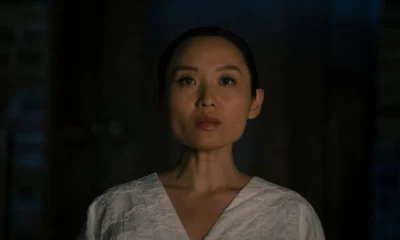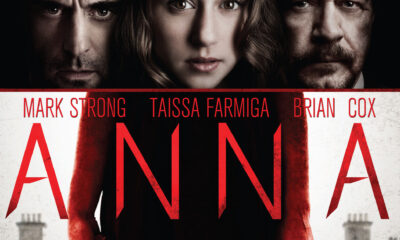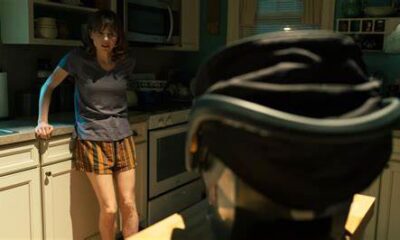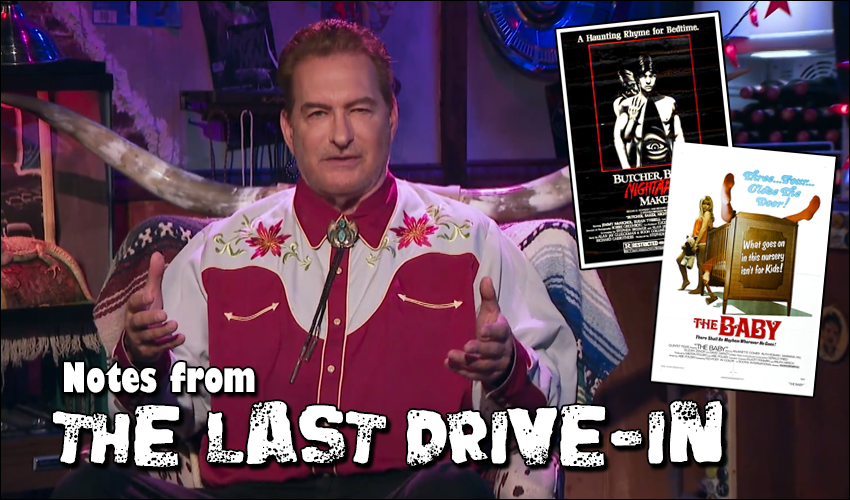
Notes from the Last Drive-In: S4E7 – ‘Butcher, Baker, Nightmare Maker’ and ‘The Baby’
Welcome back for another night at the Drive-In with venerable host Joe Bob Briggs with an arrested development double feature of Butcher, Baker, Nightmare Maker (1981) and The Baby (1973). This episode is S4E7, and we get a night with a theme that works better than previous nights this season, anchored by two strange films about sexual confusion, infantilized male victims, and bold and assertive character actresses.
So, does Shudder‘s best show dazzle this week, or is it caught in a state of arrested development? How does it compare to last week’s double feature? Let’s find out together.
Butcher, Baker, Nightmare Maker (1981)
Butcher, Baker, Nightmare Maker (sometimes referred to as the confusing Night Warning) is a 1981 exploitation horror film directed by William Ascher with some uncredit segments by Michael Miller. The film was written by Stephen Breimer, Boon Collins, and Allan Jay Glueckman, from a story by Glueckman. The cinematography is credited to Robbie Greenberg, but Jan de Bont has uncredited work on the film’s exhilarating and chaotic opening sequence. The film stars Jimmy McNichol, Susan Tyrrell, Bo Svenson, Julia Duffy, and Bill Paxton.
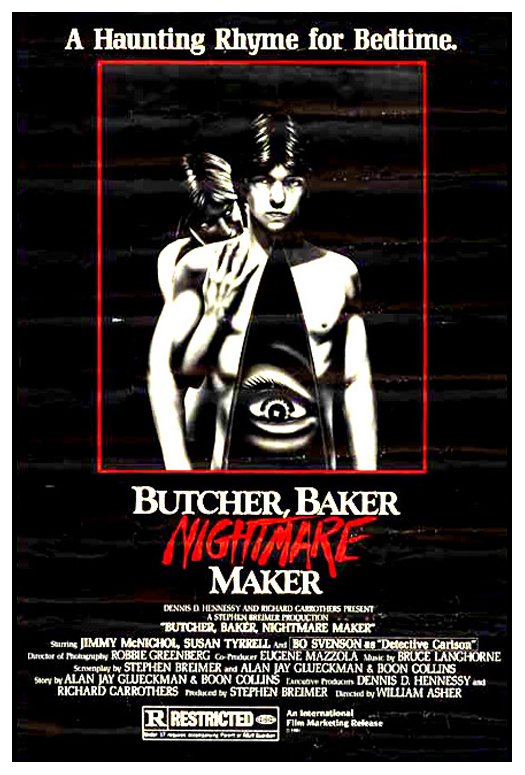
The movie is an Oedipal nightmare about a teenager, Billy (McNichol), who has been raised by his aunt, Cheryl (Tyrell), since infancy after the death of his parents in a tragic car accident. As Billy’s sights are set on leaving home for college, Cheryl begins to spiral into incestuous and murderous sexuality. In time, a bigoted detective, Joe (Svenson), begins to theorize wildly about a gay element in the events, abusing his authority and his community.
Butcher, Baker, Nightmare Maker is a mess of a film anchored by a handful of great performances and some thematic ideas that, while interesting, never coalesce into something more significant. The film’s twist is introduced somewhat haphazardly about mid-way through the runtime and doesn’t land. The movie also has an odd ending comprising two endings and a text crawl depicting later events. In many ways, the story is handled pretty poorly – the twist doesn’t feel earned, the more exciting elements of the story are brushed aside, and the overall pacing feels uneven.
The film also has an uneven feel due to direction and cinematography as the credited director and cinematographer, Asher and Greenberg, fill in for the original crew who were removed for the film. The opening sequence depicting the car accident is wonderfully shot and paced and has a real film quality. The rest of the film has the texture of a made-for-TV movie of the 1980s. One wonders how the film would have ended had the studio had more faith in Michael Miller and Jan de Bont.
The real appeal of the film comes from some of the performances. One performance that falls short is 1980s teen heartthrob Jimmy McNichol. McNichol’s Billy is generally wooden and ineffectual, with little going for him beyond looking good in peril. In most other slasher films, such a performance would be reserved for a female victim, which is an exciting component of the film’s queer coding. I get a sense of an “arrested development” theme to Billy’s story, but Billy’s aunt may better express the theme. Cheryl drives the movie.
No, the real performances in the film are those of Susan Tyrrell and Bo Svenson. The film’s energy is highest when the two are together on screen. Susan Tyrell’s menace as Cheryl is both disturbingly sexy and brutally unhinged. Her overall character actor performance style pulls the movie together through the sheer force of will that are her character choices. Bo Svenson is just a game, playing the detestable ideal of the bad cop, the one people envision when they think about the abusive excess of the law. Bo Svenson is the toxic masculinity to the unhinged femininity of Susan Tyrell.
Oh, and Bill Paxton is there being Bill Paxton. Always a welcome presence in any film.
Joe Bob-servations on Butcher, Baker, Nightmare Maker
I think that Joe Bob did a great job selling the arrested development theme of the night overall. While the film ostensibly centers around the dangerous developmental restraints placed on Billy by his unhinged Aunt, we also see that by the end, the film is very much focused on her lack of development.
I’ve been hesitant to embrace the show’s tendency this season to make a definitive claim on the themes of the pairings, especially when they do not work. I am likely the only person in the Mutant Fam who is fixated on this, but I’d prefer pairings to be less explicitly unified by the show and instead uncover them for myself. But that is just me.
Naturally, Joe Bob’s insights were welcome as ever. We return to the fascinating topic of Susan Tyrrell again after last Halloween’s Angel (1983). We also get some background on Bo Svenson and learn that he wasn’t necessarily the most popular guy on set.
My favorite discussion was about Jimmy McNichol’s role in the film’s creation and just how big of a deal he was. The McNichol craze was before my time, but I managed to get a real sense of why McNichol being in this movie was such a strange thing. While I feel Joe Bob can be a bit hit or miss regarding queer subtext in films, I think his discussion on McNichol’s relationship to the queering of the 1980s was fascinating. A great deal of it was based on a book by Jefferey P. Dennis titled Queering Teen Culture: All-American Boys and Same-Sex Desire in Film and Television, but I found the overall discussion quite interesting.
Final Thoughts on Butcher, Baker, Nightmare Maker
Butcher, Baker, Nightmare Maker is such a strange film, but one that is anchored by some incredible acting by Susan Tyrrell and Bo Svenson that you cannot help but be sucked into it. Ultimately, it seems that Butcher, Baker, Nightmare Maker is a film that seeds loftier themes and ideas than it is capable of sewing, resulting in a curious, yet ultimately minor, chapter of queer cinema. It is a film that could benefit from a remake, though any such remake would struggle to capture the scene-chewing fun of Tyrrell and Svenson.
Joe Bob gave the film 4 out of 4 Stars. I would beg to differ. I’d give Butcher, Baker, Nightmare Maker 3 out of 5 Cthulhus.
 (3 / 5)
(3 / 5)
Best Line: “Perverts and sluts! They are doing everything they can to take him away from us.” – Cheryl
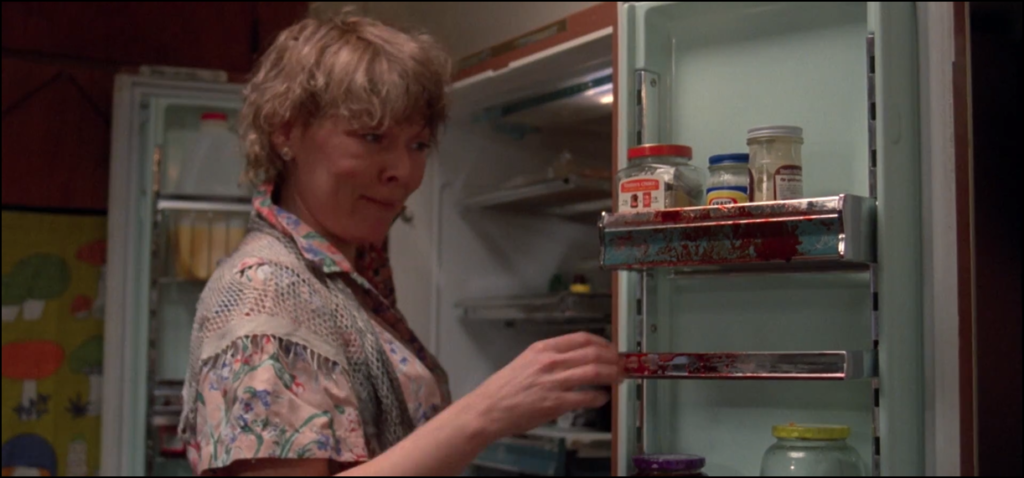
The Baby (1973)
The Baby is a 1973 psychological thriller directed by Ted Post and written by Abe Polsky, a playwright. The cinematographer is Michael D. Marguiles. Curiously, the credited director and cinematographer came into production after it had already begun. The film stars Anjanette Comer, Ruth Roman, Marianna Hill, David Mooney (credited as Manzy), and Suzanne Zenor.
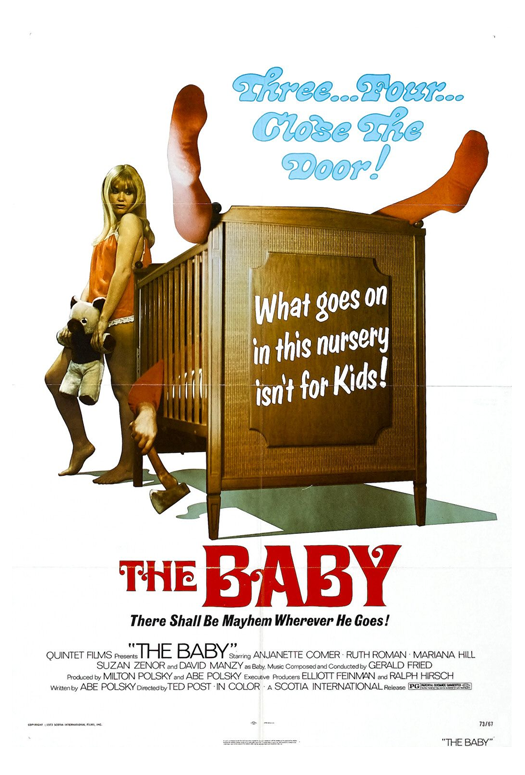
The Baby follows social worker Ann Gentry (Comer), who is still traumatized by a car accident that has had severe repercussions on her husband. Her latest case puts in in touch with the Wadsworth family consisting of Mrs. Wadsworth (Roman), sisters Germaine and Alaba (Hill and Zenor), and the intellectually disabled son, known only as Baby (Mooney) who has been raised into his 20s as an infant. The Wadsworths raise Baby as an infant and use him to pay for the home with state funds. Ann Gentry takes a particular interest in the case, but her obsession also begins to take a problematic turn.
The Baby is a pretty wild film and a great example of the “arrested development” theme of the show. Much like the preceding film, viewers are presented with a twist in The Baby, but this one feels more earned. With that being said, the set-up could have been a bit stronger. For a time, viewers may forget that Ann was even married. The story is quite good, making a strange custody struggle into an epic interpersonal conflict between two strong women, and the hapless male has been rendered into little more than an infant.
Like the previous feature, this is another film driven by performances. Ruth Roman’s Mrs. Wadsworth owns the movie, but Anjanette Comer is suitably game to keep up with her, and they play their roles with earnest and unhinged conviction. The film is propelled by the power struggle of the two women, and the push and pull between them are exhilarating. It is not even a battle of good vs. evil, as Comer’s Ann Gentry reveals a specific unhinged menace that makes viewers wonder if they can trust anyone.
Of course, maybe the film’s strangest and most affecting performance is that of David Mooney as Baby. Any actor can play what reads like an infant. Mooney inhabits the role in such a shocking and unsettling way that it can be profoundly disturbing. The vocalizations Mooney manages are haunting. An adult acting like a baby is easy to tell because generally, adults do not ambulate the right way, nor do they portray the sensory overload of an infant well enough. Mooney does, though. It’s intense.
The pacing of the film is excellent. Not a moment feels wasted. However, the cinematography is adequate but not overly impressive. The Baby is very much an actor’s film. Director Ted Post, a veteran of television, very much comes from the background of directing an actor’s medium instead of spectacle, and the film’s cinematography by Michael D. Marguiles is in line with Post’s perspective. However, the film does look good, and the transfer played on Shudder was fantastic.
Joe Bob-servations on The Baby
Joe Bob’s host segments here primarily focused on elements of the production and the apparent themes of the film. With such a strange movie, themes are a little harder to parse, so I found that Joe Bob leaned more heavily on production details. Specifically, Joe Bob paid much attention to director Ted Post and his collaboration with writer Abe Polsky. I got the impression that Post saw himself as a vessel by which to deliver Polsky’s writing, not so much wanting to interject himself or his thoughts into the feature.
The other production angle that was particularly interesting was the antagonistic relationship on set between veteran Ruth Roman and the younger Anjanette Comer. There was a lot of discussion of Ruth Roman as an actress, and Darcy even cosplayed Mrs. Wadsworth. That conveys how much of a role Roman had in the perception of the film. Of course, much was made about the performance of David Mooney and how he pretty much quit acting after playing Baby. If you’ve peaked, why climb higher, right?
Speaking of peaking, is Baby the peak of the concept of arrested development? It sure seems so.
Final Thoughts on The Baby
The Baby is a weird one. While it isn’t as extreme as Blood Sucking Freaks, it’s a very unsettling film. The internal logic is maddening, reflecting a far less enlightened perspective on abuse and development than we might see today. The film is also equally cruel and kinky, creating a wildly uneven tone that swings between camp and horror. However, it all seems to work. The core drama of two women fighting over an infantilized male creates rich opportunities for dramatic performance. If you can get through the initial revulsion that more fetishistic elements of the movie might bring on, you will witness a compelling duel.
Joe Bob gave The Baby 4 out of 4 Stars. I am pretty close to that myself. I give The Baby 4 out of 5 Cthulhus.
 (4 / 5)
(4 / 5)
Best Line: “Maybe you think too much. When it comes to Baby, I do all the thinking.” – Mrs. Wadsworth
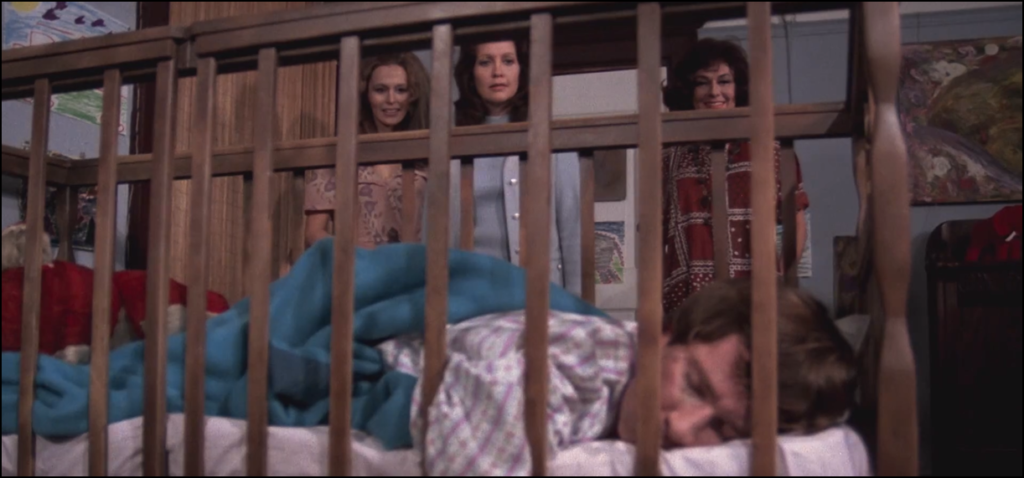
Haunted MTL Drive-In Totals
We have the official Drive-In Totals from Shudder for this evening of arrested development.
As for our totals at Haunted MTL, we have…
- 3 Bad Mommies
- 6 “Thee-ate-ers”
- Surprise Bill Paxton
- Bloody Bossom
- Boss Bitches
- Multiple Red Flags
- Gratuitous Nephew Touching
- Gratuitous Key Party Vibes
- Gratuitous Homoerotic Lockerroom Shenanigans
- Scene Chewing
- Problematic Word Dropping
- Dead Baby Jokes
- Ugly Baby Joke
- Bunny and Snake Joke
- Steven King Name Drop Fu
- Clipboard Fu
- Double Ending Fu
- Twist Fu
- Custody Battle Fu
- Chart Fu
- Billy Rolls
- Darcy Cosplay – Mrs. Wadsworth
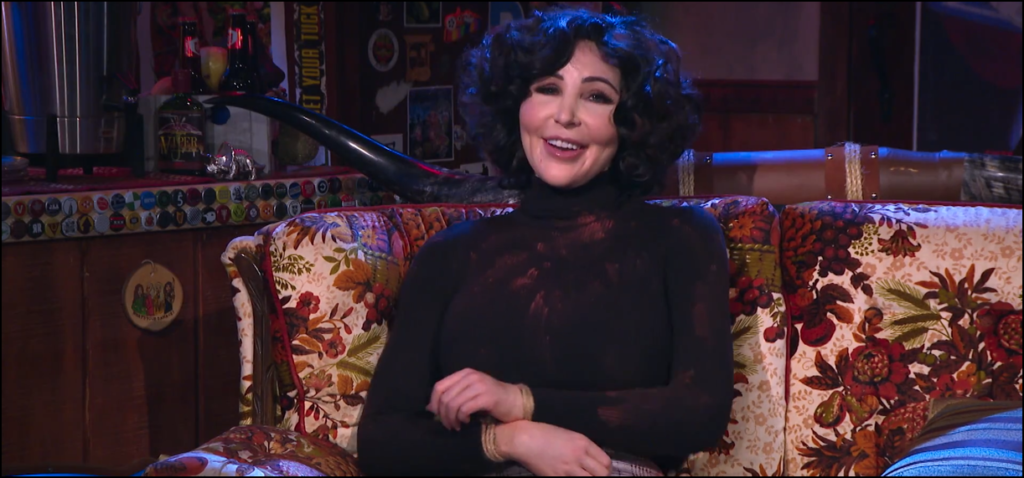
Episode Score for the Last Drive-In: S4E7 – Butcher Baker Nightmare Maker and The Baby
Season 4, Episode 7 was a solid night for the show, where most nights are pretty much solid anyway. This week’s double-feature selection may not win over every mutant, but the bonkers nature of the films and their pairing work pretty well and are worth the experience. While I think that The Baby, arguably the more unsettling film was also the better film, that is not to say that Butcher, Baker, Nightmare Maker is terrible either. The central idea of them representing arrested development worked out pretty well, though I feel these films might have been better suited for a Mother’s Day marathon.
Regardless, a fun time at the Drive-In with the mutant fam, as we have come to expect.
 (4 / 5)
(4 / 5)
What did you think about the movies? Which do you feel was better? Did “arrested development” night work for you? Let us know in the comments. We’d love to hear your thoughts!
Please join us on Twitter next Friday as we live-tweet with the rest of the Mutant Fam during The Last Drive-In with Joe Bob Briggs.
Can’t get enough of The Baby? (Sponsored)
Why not snag yourself a copy of the Arrow Video Blu-ray release of The Baby on Amazon? Using our sponsored link will help Haunted MTL continue to cover horror content.
Movies n TV
Wheel of Time A Question of Crimson Is a Political Espionage Delight
Episode two of Wheel of Time felt like the beginning of a long journey. Stories are unfolding, lives are changing, and blood is spilling.
Let’s discuss.
The story
We begin this episode in the past with Elayne’s mother, Queen Morgase. It turns out her rise to the throne was a bit, shall we say, cutthroat. So when she shows up at the White Tower, Siuan is concerned.
She might have reason to be, too.
Meanwhile, Rand, Egwene, Moiraine, Lan and Aviendha are in the Spine of The World. As they travel through some of the most breathtaking lands I have ever seen on a TV show, Egwene is plagued with nightmares. We think at first that’s just her trauma working itself through her system. But we soon find out that it might not be that straightforward.
Finally, Perrin returns home to heal after his hand is almost cut in half. But when he gets there he finds the town has been infested by Children of The Light. And they’re looking for him.
What worked
There was something heartwarming in this episode about political espionage and choking religious persecution. And that is Elayne’s relationship with her family.
I have consumed a lot of fantasy content with royal families. And I have never once heard a princess call her mother ‘Mum’. I’ve never seen royal siblings get along. And I have sure as hell never seen a princess have a good relationship with her step-parent.
This was refreshing. Even though Queen Morgase is kind of a horrible person she seems like a good mother. And that’s an unexpected delight.

Of course, this is just one storyline among many. And while this can sometimes be overwhelming, in this case it wasn’t.
I’ll be honest, some of these storylines are going to drag for me. I know this because I’ve read some of the Wheel of Time books and I have an idea that not all the characters exactly pique my interest.
No one likes all the characters. No one likes all the storylines. While I am here for the political espionage between Queen Morgase and Siuan, not everyone likes it. While others might be fascinated with Selene trying to win Rand back, I couldn’t care less.
Having multiple storylines keeps everyone’s attention better. So long as things don’t get out of hand. Things can easily get out of hand. But this seems to be managed well.
So far.
What didn’t work
As I mentioned above, I’m not thrilled with Rand’s story at this point. And while it’s fine to not like a storyline when there are this many to choose from, it’s not fantastic that the one I like the least is the one involving our two main characters. And anytime we were with the team at the Spine of The World, the only thing that brought me joy was Moirain’s hat. It reminded me of Stockard Channing’s hat in Practical Magic.
The problem is that Rand is Charlie Brown with controversial magical powers. He is boring, serious, and pessimistic.
And yes, I understand that he has a heavy emotional burden and he’s the Dragon Reborn and that’s quite taxing and all. But let’s be fair, there isn’t a single person in this show that doesn’t have a heavy burden. And most of them manage to be fun occasionally.

All that being said, this episode of Wheel of Time did exactly what it needed to do. It set up conflicts at each of the three locations. It established emotional ties between the characters and the events. And it established goals for everyone.
This was, in short, a solid episode. Not groundbreaking, not mind-blowing or life changing. It was simply good. It was entertaining and moved the plot forward.
Well done.
 (3.5 / 5)
(3.5 / 5)
Movies n TV
Wheel of Time Returns With A Bang
Wheel of Time is back for season three. There are mixed feelings regarding this. Last season, there were some serious pacing issues. And some serious sticking to the book’s storyline issues. But we’re two seasons in, and we don’t give up so easily. So let’s dive into episode one, To Race the Shadow.
By the way, I highly recommend watching this episode with the subtitles on. You’ll see why.
The story
We begin this episode with Liandrin facing a trial of sorts for her rampant betrayal. She does her best to gaslight her Aes Sedai sisters into thinking that Siuan Sanche is the real traitor.

When that doesn’t work, she reveals how many Black Aes Sedai have actually infiltrated the tower.
Spoiler, it’s a lot.
In the aftermath, our whole team gathers to drink and enjoy one night of relaxation before they head out to the Tear to form an army for Rand. All is going well until they’re attacked by myriad creatures and a sentient axe.
What worked
This episode was long. It had a run time of an hour and eleven minutes. And a lot of that run time was spent in heavy dialog scenes.
Fortunately, these were well-done scenes.
If you’re going to have a lot of talking scenes, there are good ways and bad ways to do it. Last season, we saw lots of examples of the bad way to do it. But this episode did it well. For one thing, other things were going on while conversations were taking place. The characters are drinking, playing games, walking through an interesting city. And the scenes themselves didn’t stretch out. They weren’t repetitive. We heard what the character had to say, then we moved on.
It was also nice that the point of these scenes wasn’t just info dumps. We had character development. We had romantic interactions. We had plot development and foreshadowing.
Overall, this episode felt like what it was. A moment of calm before a storm.
Taking a step back, I’d be remiss if I didn’t address the fight scene at the start of the episode. Because it was epic.
The magic looked amazing. The martial arts that went along with it looked fantastic. The costumes were beautiful. It was just incredibly fun to watch.
More than that, it was emotional. We lost some characters in that fight that were important. And it was clearly emotionally shattering for many of our characters, who found themselves betrayed by people they trusted.
So many of them.
It was a great way to open the season.
What didn’t work
Despite that, this episode wasn’t without its flaws.
First off, there were a lot of dialog scenes. And they were good scenes, as I’ve already discussed. But it was one after another after another. And when your episode is, again, an hour and eleven minutes, it’s maybe a little much to have so much chit-chat. Couldn’t some of these conversations, important as they were, have been moved to maybe another episode?
Finally, I want to talk about Egwene’s travel through the arches.

I feel like maybe there were some deleted scenes here. Because there must have been more to that visit than what we saw, right?
We could have seen Egwene battle Rand. That would have been badass and emotionally devastating. We could have seen her with a quiet life with Rand back home at the Two Rivers. We could have seen anything except for the quick clip of Rand in a bloody river, followed by Egwene being shoved back out in a bloody shift.
No products found.
Bad job. But at least it wasn’t an extended scene of Moiraine collecting bathwater, and then taking a bath while looking sad. If we’d started this season with another scene like that, it might have broken my brain.
Amazon dropped the first three episodes at once. So we’ll be back soon to talk about episode two. See you then.
 (4 / 5)
(4 / 5)
Movies n TV
Entertaining as hell: Eight Legged Freaks (2002) Review
Early 2000s is a special era for the industry. It accepts the cheesiness and corniness of movie making, in turn producing some gems in their own right. Eight Legged Freaks starring David Arquette and young Scarlet Johanson is a horror comedy about giant spiders who overtake a small town. As crazy as that premise sounds, the movie surprisingly has a ton of heart and is super entertaining. Let’s review, shall we?
Plot
We start Eight Legged Freaks with a shot of toxic waste spilling into the water supply of Joshua, a spider farm owner. He is friends with Mike, one of our protagonists, who is a science geek and a spider enthusiast. Mike notices something quite right upon visiting Joshua, but no one takes him seriously. We are then introduced to the rest of the crew. Mike’s mother Samantha, the town sheriff, is too busy chasing Ashley, his sister, who is dating the town mayor’s son Bret (something Samantha does not approve of). We also have Chris, who returns to the town to save his father’s legacy in the town mines. He has opposition from Wade, Bret’s father, who wants to use the mines for his business ventures. Lots of drama going on that will only get juicier once the spiders get loose.
The creepy crawlies quickly dispose of Joshua and make their grand appearance after Ashley rejects Bret’s advances, abandoning him in the middle of a desert. A glorious chase sequence ensues as the spiders make their way towards the town, wreaking havoc on its residents. In a true horror fashion (which the movie acknowledges), it takes some convincing from Mike and then from Samantha for the town to take the threat seriously. The tongue-in-cheek style of narrative adds the comedy aspect to a movie that would otherwise burn out fairly quickly.
The remaining characters hide out in a shopping mall as it’s the only somewhat sturdy building in the area. This doesn’t last long as the spiders break in, forcing them to run through the mines. Their resources to fight the creepy crawlies off are limited as the methane gas doesn’t allow them to use firearms. Such conditions require resourceful thinking from Chris, who uses perfume to fend off the leader of the spider group and save himself during the climax of the movie.
Character dynamics are not forgotten once the action kicks in. We have Chris confessing his long-term feelings for Samantha which she knew all along, which provided some comedic relief. Bret also reunites with Ashley and apologises for being an asshole. Mike finally gets the appreciation he deserves as his knowledge saves the townsfolk more than once during the whole ordeal.
We end the movie with the town’s radio show person telling the story as an urban legend during his segment. This brings it into question – how much of it happened the way he said it did? We can only guess…
Overall thoughts
Eight Legged Freaks is a fun creature feature with some self-aware commentary on genre tropes that doesn’t take itself too seriously. The acting is good, the pacing fitting and the characters are likeable enough for you to want them to make it through. Definitely a must watch, if you don’t suffer from arachnophobia, that is.
 (5 / 5)
(5 / 5)
- What do you get when you cross toxic waste with a bunch of exotic spiders? Eaten! The townies of Prosperity, Arizona will all become a screaming smorgasbord if mutated arachnids as big as SUVs have their way in this comedy/horror crowd pleaser whose creators include the producers of Independence Day and Godzilla
- Spiders that leap like gazelles, web-spitting spiders, spiders that suck your insides out as if through a straw—they’re all among the behemoths conjured up by an inventive effects team
- David Arquette (Scream) leads the two-legged stars, mobilizing the citizenry in a last-ditch fight to survive
Last update on 2025-03-10 / Affiliate links / Images from Amazon Product Advertising API








